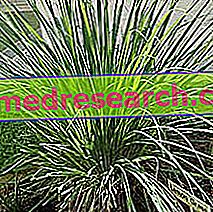
Scientific name
Cymbopogon citratus
Family
Graminaceae (Poaceae)
Origin
Tropical regions
Synonyms
Lemongrass
Used Parts
Drug consisting of leaves
Chemical constituents
- Essential oil (citral, geranil-acetate, linalyl acetate, geranial, black, limonene, myrcene, betacaryophyllene).
Lemongrass in Herbalist: Property of Lemongrass
The plant is used in folk medicine against fever, stress, excessive sweating, flu, headache and insect repellent. The essential oil is used externally against acne, but also against muscular pain (adequate clinical studies are lacking).
Biological activity
Although its use has not been approved for any type of therapeutic application, lemongrass is attributed with antibacterial, fungistatic, fungicidal and anti-inflammatory activities.
More precisely, most of the above mentioned properties are ascribed to the essential oil obtained from the plant.
The antibacterial, fungistatic and fungicidal activities have been confirmed by several studies conducted in vitro and seem to be attributable mainly to the myrcene, the nerale and the hierarchial present inside the essential oil of the plant.
The essential oil has been shown to be effective in counteracting both Gram-positive and Gram-negative bacteria, although the latter proved to be less sensitive to antibacterial action. However, the essential oil has shown itself to be bactericidal against Escherichia coli .
As far as the antimycotic action is concerned, however, lemongrass oil has proved useful in combating different species of fungi and has proved particularly effective in inhibiting the growth of Candida albicans .
Studies conducted on animals have instead shown that the decoction of lemongrass leaves has a mild anti-inflammatory action and a slight analgesic action at the peripheral level. Furthermore, this decoction has also shown to have a weak diuretic action.
Finally, the lemongrass is able to exert a repellent action on insects.
Lemongrass in folk medicine and homeopathy
In folk medicine, lemongrass is used externally for the treatment of rheumatic pain, lumbago, neuralgic pain and sprains; as well as being used as a mildly astringent remedy.
Internally, however, traditional medicine uses this plant for the treatment of agitation and gastrointestinal disorders.
Another unapproved use of the lemongrass - and, more precisely, of its essential oil - concerns the external application of the latter on joints and muscles to reduce their possible rigidity.
In Indian medicine, however, lemongrass is used in the treatment of various disorders and diseases, such as fever, bronchitis, flatulence, gastric disorders, intestinal parasites and even leprosy.
As far as homeopathic medicine is concerned, on the other hand, at the moment the lemongrass does not find significant uses in this area.
Side effects
If used correctly, lemongrass should not cause any kind of side effects. However, following the application of ointments containing the essential oil of the plant, allergic reactions may occur.
In addition, two cases of alveolitis occurrence have been reported following the inhalation of lemongrass essential oil.
Contraindications
Avoid taking lemongrass in case of hypersensitivity to one or more components. Furthermore, the use of lemongrass is also contraindicated during pregnancy.
Pharmacological Interactions
Not known



